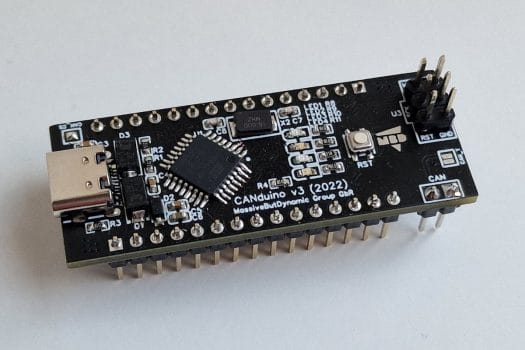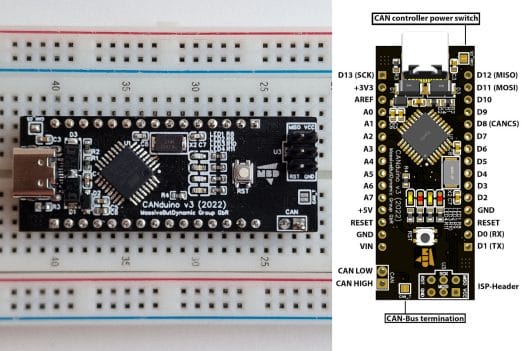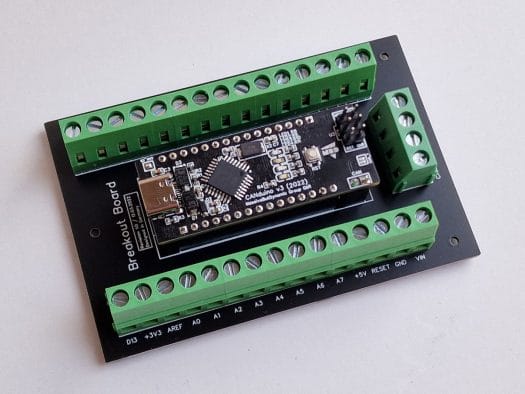CNX Software – Embedded Systems News
Reviews, tutorials and the latest news about embedded systems, IoT, open-source hardware, SBC's, microcontrollers, processors, and more
CANduino v3 is the third revision of MassiveButDynamic’s CAN bus board with Arduino Nano form factor based on Microchip ATmega168PA 8-bit AVR microcontroller, Microchip MCP2515 CAN controller with an SPI interface, and Microchip MCP2551 CAN transceiver suitable for 12V and 24V systems.
The CANDuino v3 board is now slightly narrower in order to give access to two rows on each side when installed on a breadboard, comes with a USB Type-C port to reduce the number of cables needed, and the CAN bus function can be deactivated via a jumper in order to use the CANduino as a normal Arduino Nano.
CANDuino v3 specifications:
The board is programmable in the Arduino IDE using the following board manager URL: https://mcudude.github.io/MiniCore/package_MCUdude_MiniCore_index.json. If you prefer having terminal blocks to connect the CAN Bus and I/Os there’s also a breakout board that does just that.
Both CANDuino v3 and the breakout board were designed in EasyEDA, and you’ll find the PDF schematics, JSON files for EasyEDA, Gerber files, and BoM on Github.
The Arduino Nano compatible CAN bus board is sold on Tindie for $39.99, and the optional breakout board adds $11.95.
Jean-Luc started CNX Software in 2010 as a part-time endeavor, before quitting his job as a software engineering manager, and starting to write daily news, and reviews full time later in 2011.
Support CNX Software! Donate via PayPal or cryptocurrencies, become a Patron on Patreon, or buy review samples
Related posts:
Why can’t they just leave the 8bit to rest ?
Give yer gead a shake…Because it works just fine the way it is.
If it ain’t broke don’t fix it..
Wondering what would happen on the market if an ATMega with RISCV core would turn up…
$39? even with chip shortages this is over priced old kit.
When it comes to cheap CAN boards, my favourites are those “odometer filters”.
(Ignore their original questionable function).
I’ve seen 5-6 different types, historically they were NXP LPC2114 or STM32 – but with chip shortages it looks like the newer versions are using clones – GD32 or APM32.
You get a 32bit MCU, 2x CAN transceivers, 12V > 5/3.3V LDO and handful of GPIOs all for ~$15-20.
40usd? That is a joke, right? Even tat optional BOB for 12 USD i bought at Ali some 3 years ago for i think 2 USD
This thing is way overpriced and the MCP2515 CAN/SPI bridge chip is really hard to find. Try this instead: [Kevin O’Connor] writes to us about his project, can2040 – adding CAN support to the RP2040. The RP2040 doesn’t have a CAN peripheral, but [Kevin] wrote code for the RP2040’s PIO engine that can receive and send CAN packets.
https://github.com/KevinOConnor/can2040/blob/master/docs/Features.md
As far as I can see, they sell from Germany. If they are also made in Germany that would explain the price. The sales taxes alone they have to pay are 19% in Germany. Of course, the ones from China are much cheaper and I would most likely go for those, but if I have a project where I have limited space, I will definitely go for the Canduino.